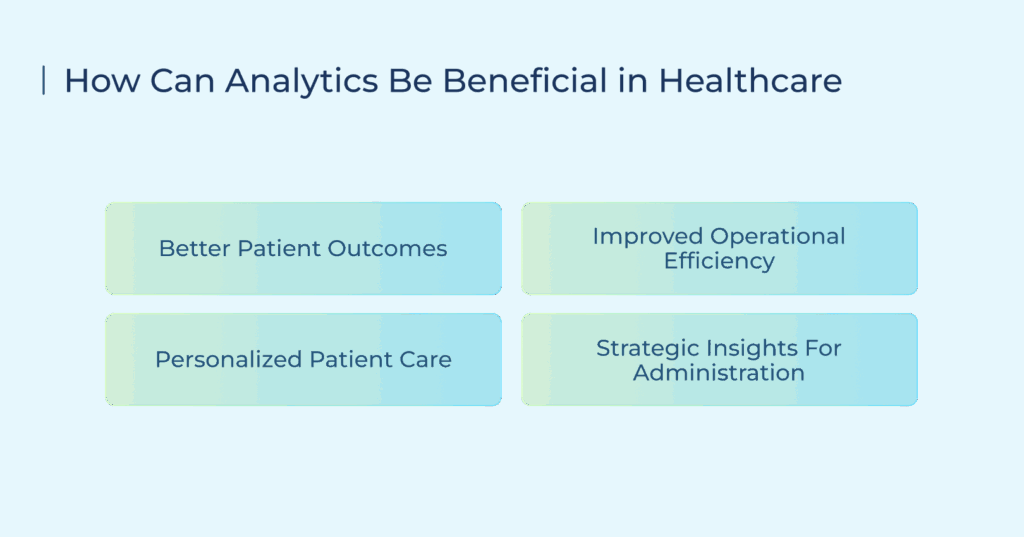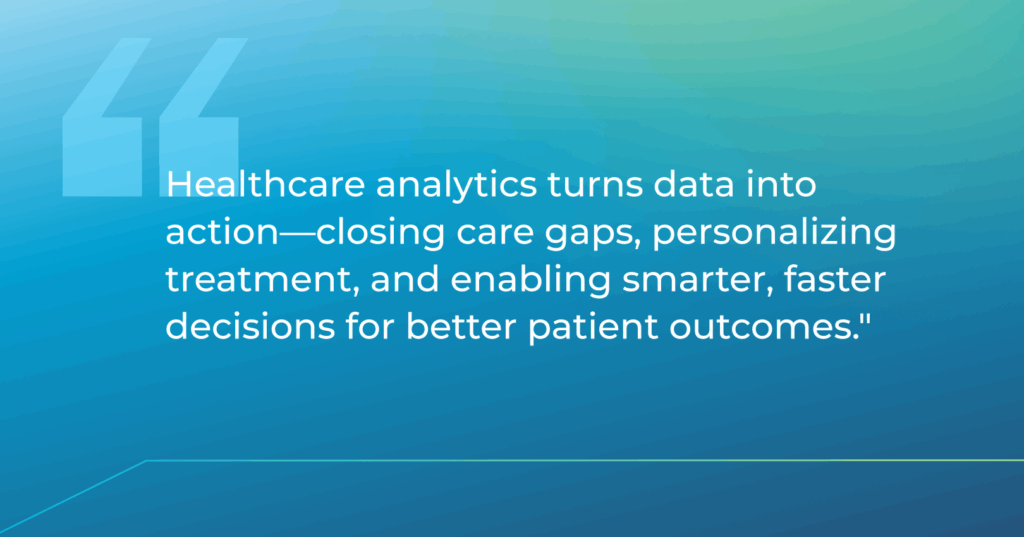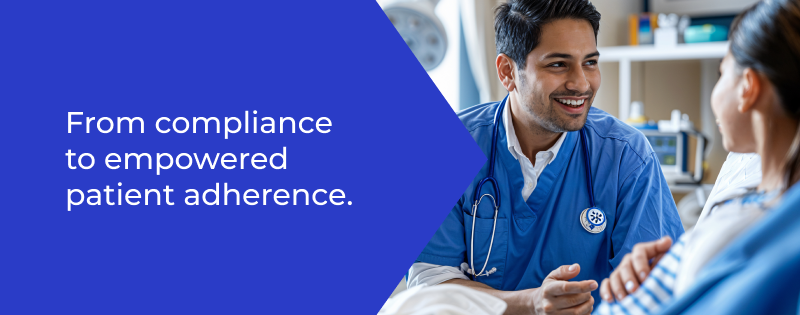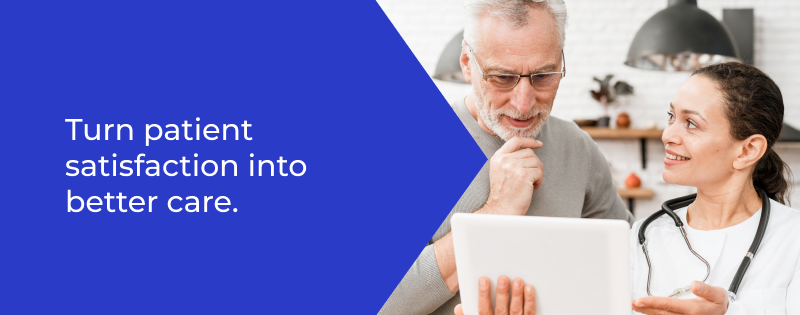Surveys are helpful, but they often hide underlying issues. Someone who was able to book…

How Analytics in Healthcare Transforms Patient Outcomes
The right tools enable you to catch care gaps before they turn into real problems, or else, every missed check-in or unanswered message can quietly chip away at your patient’s progress.
That’s the power of using analytics in healthcare. We’re not talking about predicting the future here. We’re talking about using the data you already have to make smarter decisions.
Let’s look at how healthcare teams are doing just that to improve their follow-ups, close care gaps, and keep patients on track.
What’s Analytics in Healthcare?
Analytics means using healthcare data to spot patterns and trends that can support future decisions. This data includes your patient’s medical history, your operational systems, and even clinical notes.
It helps care teams track what’s happening across departments to make faster and smarter decisions. Instead of guessing why patients cancel visits or where delays happen, providers use analytics to get clear answers backed by numbers.
For example, TeleVox’s Insights360 applies this principle by providing a clear, data-driven view into patient engagement patterns and pinpointing exactly where patients disengage or drop off in the care journey.
How Can Analytics Be Beneficial in Healthcare
Healthcare organizations rely on a range of analytic tools to turn raw data into clear, usable insights, helping them make better, faster decisions at every level.

Better Patient Outcomes
Clinical teams get help choosing the right treatments. If certain procedures lead to more infections or longer recovery times, analytics helps identify the problem so teams can adjust their approach. The system also checks if medications might interact badly or if a dosage seems too high for someone’s kidney function. This backup support helps prevent medical errors that could harm patients.
Improved Operational Efficiency
A hospital or clinic is made up of several moving parts. Keeping track of everything at once is nothing short of a challenge. However, thanks to analytics, your administrators know when they need more nurses in the emergency room or fewer staff during slower periods.
This holistic view of sorts highlights areas where workflows can be further optimized. So, if your patients are waiting for hours for a simple test, your analytics will tell you, making it easy to address bottlenecks.
The data also reveals when to stock up on medicines and equipment, and how much. More advanced analytics tools can even use market pricing trends to alert your admin to stock up because the price is low. Hence, you not only avoid running out of supplies but also end up saving money on each purchase.
Personalized Patient Care
Your core database is always comparing new patients with similar cases from the past. That’s healthcare analytics that goes through thousands of patients to highlight which treatments typically work best for people with the same symptoms and medical history.
Analytics help make communication more personal. Some patients actually read text message reminders, while others ignore them completely, but always answer phone calls. Your analytics figures out each person’s preferences so messages reach them effectively.
Strategic Insights for Administration
If there’s a high demand for a particular specialty that nobody else offers locally, your analytics will inform your management. Revealing such opportunities helps healthcare organizations make smart decisions. They can safely decide where to invest and how to grow their services. There’s no guesswork involved. Their decisions are backed by actual, real-time data and trends.
Analytics Use Cases for Healthcare Providers
Healthcare organizations collect massive amounts of patient data every single day. Rather than just sitting on them, they are being fed to data analytical tools to spot service gaps and help providers shift to more proactive care by turning raw medical data into actionable insights.
Helping Patients Stay on Track With Medications
Another use case for analytics is keeping tabs on patients who are the most likely to stop or forget taking their medications. Healthcare providers can send timely alerts using reminder tools to give a friendly nudge to take their medication via either automated calls or simple texts.
Population Health Management
Treating large patient populations like a single group is a mistake. Data analytics helps by automatically segmenting patients into different groups based on their conditions, medical history, and needs.
So, patients with poorly controlled blood sugar can receive outreach calls for dietitian consultations.
Not to forget, preventive care analysis uses this same population data to identify patients who are overdue for screenings.
Reducing Patient Readmissions
There’s another advantage of using analytics to identify high-risk patients. You’ll also be reducing patient readmissions within, say, 30 days of discharge. Hence, fewer repeat visits, lower costs, and more room to treat other patients who need help for the first time.
Once the system flags someone likely to come back, care teams get ahead of the problem. They reach out early to schedule follow-ups, review medications, and catch any issues before they turn into another hospital stay.
Challenges of Analytics for Healthcare and How to Address Them
Healthcare organizations are using analytics to improve outcomes, close care gaps, and make faster, smarter decisions. This shift from reactive to proactive care is reshaping how treatment is delivered.
Privacy regulations make everything complicated. HIPAA compliance adds layers of security requirements that slow down analytics projects. Healthcare organizations need dedicated compliance teams and regular security audits to avoid the data breaches that affected 66+ facilities in April 2025 alone.
Your data probably isn’t as clean as you think. You need to standardize how your data is kept to make the most of your healthcare analytics. Check for missing patient information, duplicate records, and inconsistent formats.
Different EHR vendors may lead to integration problems. Every system uses varying data formats. Consider this. Your EHR interacts differently with your lab than it does with your pharmacy. Getting all these systems to share data in consistent formats requires technical expertise and often expensive integration projects.
Patient consent and algorithm fairness create ethical headaches. Using medical data for analytics raises questions about privacy and bias. You need ethics committees and regular audits to ensure your analytics programs treat all patients fairly.

Transform Your Patient Outcomes With Data-Driven Insights
Better outcomes start with clearer visibility. TeleVox puts practical analytics in healthcare to work. We help your team catch care gaps early, improve follow-up, and keep patients engaged.
Our platform connects with your EHR, tracks patient interactions across channels, and delivers insights you can actually act on. From missed appointments to delayed responses, TeleVox brings your attention to where it’s needed.
With tools like Insights360 built right in, you’ll finally have the data to back every outreach decision. Want to see how it fits into your workflow? Schedule a demo and let’s take a closer look.



